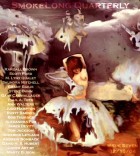First of all, this story… bam! It really just punches the reader in the gut. The setting of scene is very vivid. How does your film background color your writing?
Well, thank you! When you write a screenplay, the number one rule is “Don’t write what you can’t see.” All of those internal meanderings literature characters can enjoy never happen in film because the director can’t shoot someone’s thoughts. When I move from screenwriting to fiction, that rule is so ingrained that my first drafts are all visual- it’s a perspective I can’t just turn off, but in later drafts, I return to add the other senses, so I’m pretty pleased with the texture my universes have. Sometimes I may not say much, but hot damn, you can see and smell it!
Tell us a little bit about Book of Stories.
Book of Stories is a fantastic project that Dreaming Tree Films has been doing for several years in cooperation with Chicago’s Afterschool Matters Program. ASM gives inner-city kids an opportunity to intern in careers they might not otherwise be exposed to during their regular curriculum, and it’s a real job- they apply, they are hired, and they work *hard*. The section we work with, Tech 37, sends us kids from two different Chicago high schools per semester, and the kids learn how to make a movie from the ground up.
Under the tutelage of adult instructors, these kids do all the pre-production, from auditioning to storyboarding to obtaining film permits; they do all the production work- they run the cameras and sound and herd the production from place to place, and they do all the post-production, including editing and creating trailers for their films. They even come up with the ideas for the films, but because each team has to complete three short films in six weeks, there’s just no time for them to learn the fairly arcane art of screenwriting. The series’ producer-director, Estlin Feigley, sits down with each team to develop ideas, and when they find three they like, they send them to me to flesh them out into ten-minute screenplays.
It’s challenging for me, because I’m working outside of concepts and themes I’d usually come up with if I were working on my own, and it’s a challenge for the kids to get comfortable with seeing what I’m doing with their ideas. Film’s a collaborative art and I really enjoy my part in the chain—most of the time, once they see the finished product, the kids do, too.
So you’d like to harass goats, eh? Do you have any?
I don’t! To be honest, I’m kind of scared of them. Their oblong pupils are just wrong, and I had a traumatic dress-eating encounter with a goat once in a petting zoo.
I’m always fascinated when I see that a story like this was written by a mother. What was the genesis of this piece?
I’ve stayed home with both of my children, and no matter the glowing, pastoral picture of domesticity that people like to imagine when it comes to living out the June Cleaver ideal, occasionally, there are those days… there are those thoughts that you never admit to having… Spending 24-7, 365 days a year at work, no matter how delightful that work may be most of the time, there are frustrations. Since most mommies aren’t sociopaths, they keep going and then kick back with a cup of coffee at the end of the day, pulling out only a little of their hair in the process. I kick back at the end of the day with a warm monitor and kill people on paper.
Bet you’ll wonder about that sweet, cupcake-bearing kindergarten room mother from here on out, won’t you?
We’d love to hear about your feature film. Will we be able to see it?
I certainly hope so! The working title is “A Rain of Blood,” and it’s being produced by Dreaming Tree as well. It’s a bit of a departure, because my producer and I came up with the idea on a slightly tipsy walk home from downtown Mystic, Connecticut after hours on another shoot we had this summer.
Shakespeare borrowed from so many sources to write his plays, and so many of them concentrate on the themes of revenge and love… well, wouldn’t it be cool if we did a Shakespeare revenge remix? It turns out that Hamlet and Macbeth fit together perfectly, if you assume Hamlet lived and went on to assume the name Macbeth. It’s an adaptation in the sense that I kept a great deal of the original dialogue, but it’s a new piece in the sense that I remixed that dialogue (and added new segues of my own,) to tell a completely new story.
When it’s finished, the production company will submit it to various film festivals, and if we’re very lucky, we’ll negotiate a good distribution deal. It’ll be a small-release independent, but I think we have a pretty good chance of coming to a tiny, decrepit little arthouse near you!



 The SmokeLong Grand Micro Contest (The Mikey) is now an annual competition celebrating and compensating the best micro fiction and nonfiction online.
The SmokeLong Grand Micro Contest (The Mikey) is now an annual competition celebrating and compensating the best micro fiction and nonfiction online.